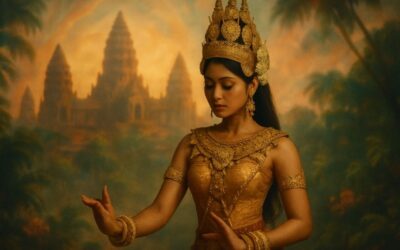In the vast, sun-drenched savannas of Kenya, where the horizon kisses the sky, and golden rays transform the grass into a shimmering sea, the Maasai stand tall. A proud warrior tribe, they are recognizable by their distinct, vibrant attire, intricate beadwork, and elegant stance. However, what truly binds the Maasai and sustains their identity is the powerful oral tradition that has coursed through generations, weaving tales of valor, love, and unity.
Once, as the sun bid adieu to the day, casting long shadows on the undulating plains, an elderly Maasai named Olekuai gathered the young ones around a roaring fire. As the flames danced, illuminating eager faces, Olekuai began a tale, one passed down from his ancestors.
This wasn’t just any story; it was the story of their people. The Maasai, unlike many other tribes, did not document their history through written scripts or carved tablets. Instead, their history lived in tales told by elders, in songs sung by warriors, and in dances performed during ceremonies. This tradition, rather than merely being a way to pass the time, was a vessel to transmit the collective wisdom and values of the tribe.
Olekuai’s tale was about the origin of the Maasai, of how they came to be the custodians of the vast lands stretching beneath the blue skies. As his voice rose and fell, mimicking the very rhythm of the land, the youngsters were transported to an era where humans and nature were intertwined, where every action carried a meaning, and every tale was a lesson.
The Maasai oral tradition is not just about recounting the past; it’s about cementing the present and guiding the future. In a rapidly globalizing world where modernity threatens to erode indigenous identities, these tales act as anchors. They remind the Maasai of their unique role in the world, of values such as bravery, respect, and coexistence with nature.
Songs, another integral part of the Maasai oral tradition, often speak of love, challenges, and victories. When young warriors, or Morans, leap into the air during their dances, their chants narrate tales of courage and honor. This serves as both inspiration and instruction to the youth, teaching them the Maasai way of life and what it truly means to be a part of this magnificent tribe.
For a culture that thrives in harmony with nature, oral traditions also pass down vital knowledge about the environment. Elders, through tales, impart wisdom on tracking animals, predicting weather, and understanding the healing properties of plants. This knowledge, accumulated over millennia, ensures that the Maasai continue to thrive in their environment.
But why the insistence on oral tradition? Why not document these tales, solidifying them in time?
The answer lies in the Maasai’s profound understanding of human connection. By relaying tales orally, each story is infused with emotion, with context, and with a lived experience that cannot be captured on paper. Every retelling becomes an event, a shared experience that strengthens community bonds. The listener doesn’t just hear the tale; they feel it, live it, and internalize it.
Moreover, oral traditions ensure dynamism. As tales pass from one generation to the next, they evolve, incorporating contemporary lessons and challenges, ensuring relevance and resonance with every new generation.
However, as modernity encroaches upon the vast savannas and young Maasai increasingly migrate to urban centers, there’s a poignant challenge: How does one keep this rich oral tradition alive?
The answer, surprisingly, lies within the tradition itself. The Maasai have always adapted, always evolved, yet remained rooted. By intertwining their tales with modern mediums, by sharing their stories with the world, and by continuously celebrating their identity, the Maasai ensure that their oral tradition doesn’t just survive, but thrives.
As the night deepened and Olekuai’s tale came to an end, there was a profound silence. The young ones, with stars in their eyes, weren’t just entertained; they were enriched, connected to their past, and empowered for the future.
And so, in the heart of Kenya, the Maasai oral tradition continues its timeless dance, echoing tales of the past, resonating values of the present, and inspiring visions of the future. Through words, songs, and dances, the soul of an entire culture finds its voice, reminding us all of the unparalleled power of storytelling.










0 Comments